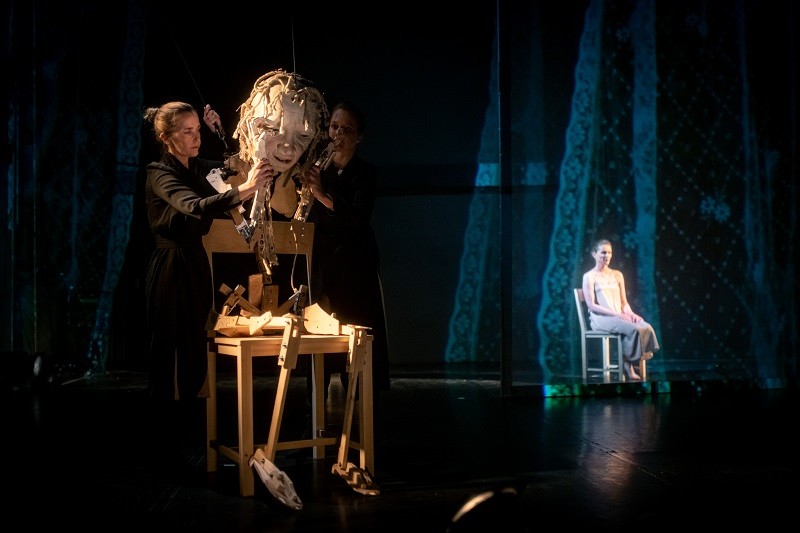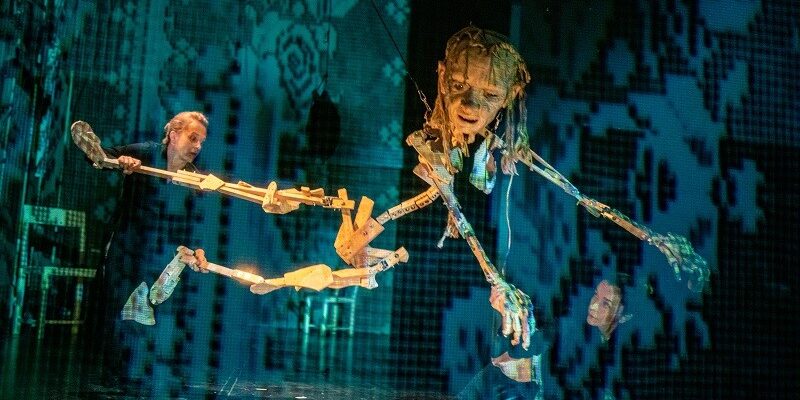Anton Podbevšek Teater, premiere 11th November 2022 (part of 58th Maribor Festival)
There’s a moment in Ivo van Hove’s stage adaption of All About Eve when actress Margo Channing – played by the magnificent Gillian Anderson – catches sight of her reflection in the mirror. On video screens above the stage, we watch a projection of her face aging, her skin creasing, her hair thinning. She is horrified, we are supposed to be too, I think, to see ageing as the ultimate tragedy that awaits every woman, particularly one whose career is built in part on her looks. We are invited to share her repulsion.
This image is replicated in Ivana Djilas’ show for Anton Podbevšek Teater. We are presented with digital images of young faces aging rapidly, the skin sagging, the eyes pouching, the still defiantly red- lipsticked mouth puckering. We flick backwards and forwards between the old face and the young.
The text, which is based on Croatian writer Slavenka Drakulić’s Invisible Woman and Other Stories, consists of a collage of stories about the pain of ageing, from the shock of catching a glimpse of an old face – your old face – in the mirror, of realising that is how the world sees you, to a moving sequence in which a woman recalls how her translator husband gradually lost his words to dementia. The mirror incident is not as nearly brutal as the sequence in which a decidedly not young man in the street simply appears not to see the speaker, to regard her as merely another bit of street furniture to sidestep, not a human with whom he might engage, certainly not as a sexual being.
The text frequently shifts perspective, sometimes the storyteller is old, sometimes not. A young woman bathes her elderly mother and is confronted with her naked body for the first time. An older woman recalls the humiliating moment her bladder gave out when in public and she realised she could no longer trust her body anymore. The text occasionally moves into the realm of fable and fairy tale, home of the crones but also the ‘wicked’ stepmothers mourning the loss of their beauty. (In this it is also reminiscent of Dubravka Ugrešić’s Baba Yaga Laid an Egg, another myth-rich text about the cloak of invisibility that descends on women as they age).
All of this is narrated by Špela Frlic, barefoot and wearing a pale shift dress. She has a soothing, elegant speaking voice; she narrates as if telling a bedtime story, perching at first on an oversized chair. But the stories she tells are not soothing.
On the other side of the stage, a puppet (designed by Gregor Lorenci), with spindly wooden limbs and a large head framed by ragged hair, is manipulated by Maja Kunšič and Katja Povše. They sometimes seem to do battle with this puppet which is at once cumbersome and fragile, grotesque and vulnerable. Sometimes they drape the puppet over their bodies. at other times they gently lift it into the air, in a visual echo of the scene in which the daughter bathes her mother.

Invisible Women. Photo: Borut Peterlin
As Frlic speaks, images of net curtains are projected around the stage. Occasionally these are replaced by images of red high heels, the archetypal image of female sexuality. Finally, we are presented with the aforementioned sequence featuring three rapidly ageing female faces.
A series of chairs of different sizes are also introduced to the scene and ever so carefully positioned, before finally being stacked on top of one another. Frlic ends up precariously perched on top of this tower of chairs, still speaking in the same soft tones.
The adaptation by Frlic and Djilas captures Drakulić’s clarity as a writer and the way she uses simple details to convey so much. It captures her dry wit and her keen eye as a storyteller, her way of cutting straight to the heart of the matter. Yet while Frljic is a compelling presence even while mostly sitting still, the mixture of puppetry and storytelling don’t always gel (at least until the very end).
However, the dramaturgical decision to have a young woman narrate these stories didn’t always sit well. While perhaps done to juxtapose youth with the inevitability of ageing – after all, as the text says, the old don’t often think of themselves as old, that’s why the reality of the mirror always comes as a jolt – it was hard not to notice that older women were also physically missing from the stage. This may well be a form of meta commentary on how we package such stories and it’s true they would have landed differently issuing from the lips of someone closer in age to the women being discussed, but it was hard not to find the absence strange at times. While the gently mesmeric production gives ample space and time to women’s experience of ageing, sometimes it feels disconnected from the things it’s describing.
Credits:
Director: Ivana Djilas// Translation/adaptation: Špela Frlic, Ivana Djilas//Designer and puppet maker Gregor Lorenci// Set designer and light designer Sara Slivnik//Video designer Vesna Krebs//Costume: Jelena Proković//Composer: Boštjan Gombač//Choreographer Branko Potočan
For more info, visit: borstnikovo.si/
Natasha Tripney is a writer, editor and critic based in London and Belgrade. She is the international editor for The Stage, the newspaper of the UK theatre industry. In 2011, she co-founded Exeunt, an online theatre magazine, which she edited until 2016. She is a contributor to the Guardian, Evening Standard, the BBC, Tortoise and Kosovo 2.0








